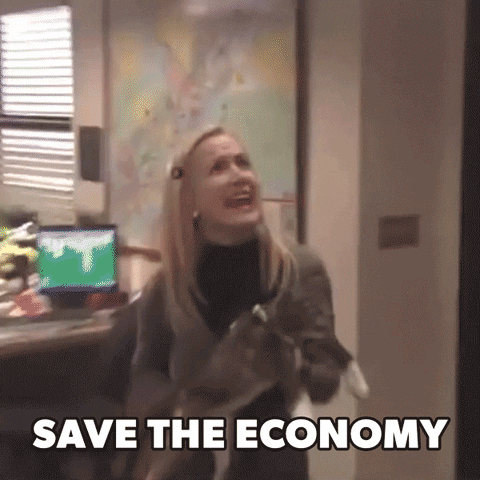This has been the longest election season in recorded history. Andrew Yang was the first Democrat to declare his candidacy from the Democratic side on November 6, 2017 (Donald Trump filed his paperwork for re-election on January 20, 2017, the day of his inauguration). The vast majority of candidates filed in January through May 2019. At one point there were a record 25 Democrats (also a record) running for the position Joe Biden eventually won. We are finally down to the final week before the election.
With turnout expected to be the highest since the early 1900s I still believe anything can happen. The media and Wall Street seem to think both a Joe Biden victory and Democrats taking over the Senate is a slam dunk. At the same time, a stimulus deal seems to be dead, despite an economy still struggling to recover. We also have a surge in COVID cases at the top of the newsfeed as we start the week.
Let's take a quick look at all 3 topics:
A Landslide Election?
I sit in on a lot of election calls to see what Wall Street firms have to say. The last part of the week several of them started talking about a potential landslide election where the questionability of mail in ballots is not an issue. They believe a significant enough amount of people have decided to either vote early or will vote in person. Several states are reporting over 20% of voters already casting their ballots during early voting.
Since the first debate, the betting odds of a Donald Trump victory have dropped dramatically.

The betting odds take into account the electoral college. Maybe they know something we don't. RealClearPolitics.com shows 181 toss-up votes still out there. This is a much more difficult map than Donald Trump faced in 2016, with Joe Biden seemingly already locking up 86% of the votes needed for victory. Anything can happen.

Tomorrow (Tuesday) we are hosting part 2 of our special "Preparing Your Portfolio for the Election" SEM University. We'll be digging deeper into the economic ramifications if we do see a Biden victory. We'll discuss how SEM's models are set-up to adapt if Biden prevails as well as the things we all need to be focusing on in the weeks after the election.
Sign-up here. If you're reading this after Tuesday, we should have the replay accessible from the same link:

A Struggling Economy
One of the major topics of our webinar will be the impact on the economy. It was struggling before COVID. COVID has caused major damage to certain segments of the economy. Our economic model identified the slowing economy in early 2019. Despite what will be an impressive Q3 GDP number, the economic recovery is slowing.

I discussed this in detail here:

At issue is the large divide in our economy. Some segments are doing even better than they were in February. Others are facing a depression. Either victor will have to figure out a way to help one without hurting the other.

COVID Concerns
Once again we are hearing about "record" number of new cases in the United States as well as in many European countries. Overall the positivity rate in the US has risen from the low of 4.3% in early October to 6.2% last week.

Below 5% is generally considered a safe zone in terms of community spread. Scientists have prescribed social distancing measures and mask mandates if a local area sees a spike above 5%. It's amazing how quickly things can change. Last month I had told some advisors the way things were going I was planning a trip to our Arizona office in mid-November (I used to spend one week a quarter there, but haven't been back since my March trip.) Looking at the numbers this weekend, it looks like I won't be in Arizona until at least January. Things may be ok in Arizona in December, but our second grandchild is due here in Virginia in mid-December, so I won't be going anywhere anytime around his due date.

Rt, a measure of how fast the virus is growing shows nearly every state above 1.0, which means it can spread quickly.

3 months ago only 14 states had an Rt above 1.

While some communities are seeing a spike in hospitalizations, which can turn into deaths, we've not yet seen a big increase in the death rate. This is good news. The President's specialized treatment highlighted some of the positive developments we've seen in dealing with the virus. Unfortunately, it doesn't make it less deadly for some since not all of the treatments the President received are approved and even if they were there is nowhere close to enough dosages available if we see widespread severe cases.
One of our Cornerstone partners, Eventide Funds posted another Coronavirus Update. For those of you unfamiliar with Eventide, their Chief Investment Officer, Finny Kuruvilla is an MD and a PhD in Chemistry and Chemical Biology. There are a lot of positive things happening, and Dr. Kuruvilla highlights those in this update:
We have more cases, but deaths are not going up at a significant rate.


The highlights from the Eventide update are:
- Masks work – they do not prevent you from catching COVID, but studies have shown the VIRAL DOSE is significantly lower when wearing a mask. The lower the dose, the lower the severity of the disease. This has been critical in lowering the number of deaths.
- New treatments are encouraging – whether drugs or the ways doctors diagnose and treat patients they are much more able to quickly keep the disease from becoming severe.
- We will get a vaccine, but likely won't have it until after February and even then we will not have the doses promised by the President.
- Rough estimates show we could reach the hypothetical "herd immunity" around February or March of next year.
I was so encouraged after this latest update. It was based on science, data, and no political slant. That has been key throughout this pandemic and will be key in the weeks, months, and years ahead.
No matter what happens, we will be ready.






